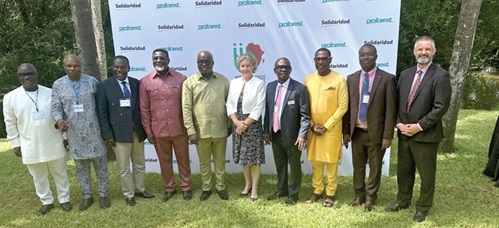The government is finalising a policy document aimed at reviewing taxes and levies on vehicles and equipment imported into the country for industrial and agricultural purposes.
The policy which is expected to be tabled before Parliament for approval is to help stimulate industrial growth and provide crucial support to the agriculture sector.
It is part of the promises made by the ruling National Democratic Congress (NDC) in the run-up to the December 7 general election.
Although highly anticipated in the 2025 budget, details of this initiative were not featured in the financial document which was the government's first major policy statement.
Speaking to the media at the opening of the ninth Africa Sustainable Commodities Initiative (ASCI) Regional Meeting in Accra on May 6, the Minister of Food and Agriculture, Eric Opoku, assured that the government would soon table the document to review taxes and levies on imported equipment meant for agriculture purpose before parliament for approval.
The meeting
The two-meeting day was co-hosted by Proforest and Solidaridad to help chart a bold course for sustainable agriculture that protects livelihoods, forests, the climate, and enhances economic productivity.
The meeting also included high-level delegation of ministers, government officials, civil society actors, and private sector leaders from– Cameroon, Central African Republic, Côte d'Ivoire, Democratic Republic of Congo, Gabon, Ghana, Liberia, Nigeria, Republic of Congo and Sierra Leone, representing 75 per cent of Africa’s tropical forests and 25 per cent globally.
ASCI is a multi-stakeholder platform that puts producer countries in Africa at the forefront of defining the principles for the sustainable development of cocoa, rubber, palm oil, coffee and other commodities, in a way that protects livelihoods and natural resources.
One stop shop
Mr Opoku said the government was also in the process of establishing farmers service centres in all the agricultural districts across the country.
He said the centres were expected to serve as a one stop shop for all the farmers in the districts with tractors, combine harvesters and all the equipment that would be required by farmers for their activities.
“Then we have the improved seeds, fertilisers, agricultural extension officers and their motorbikes at the centre.
“So, if the farmer goes to the centre and then indicates to the centre that, I want tractors for my farming activities, even if the farmer does not have money, the centre will release the tractors to go and work for him,” he said.
The minister underlined the country’s commitment to sustainable, climate-smart agriculture and the importance of aligning national priorities with global trade standards and environmental targets.
“Ghana has taken bold steps, particularly in the tree crop sector, through the establishment of the Tree Crops Development Authority (TCDA) which plays a pivotal role in regulating and supporting the sustainable growth of priority crops such as oil palm, rubber, coconut, mango, cashew, and shea to reshape the future of non-cocoa tree crops.
Solidaridad’s activeness
Ghana Country Representative of Solidaridad West Africa, Eric Amoako Agyare, said Solidaridad has been active in West Africa’s oil palm sector since 2012, working to improve yields at both the farm and mill levels through the introduction of best management practices (BMP) and improved processing technology.
He said Solidaridad and other partners were implementing the National Initiatives for Sustainable and Climate-smart Oil Palm Smallholders (NISCOPS) programme, with funding support from the Dutch Ministry of Foreign Affairs and the United Kingdom (UK) Foreign, Commonwealth & Development Office (FCDO).
“As part of this programme, we are pleased to co-host this 9th ASCI platform meeting in partnership with Proforest,” he said.
Lessons
Group Director of Proforest, Abraham Baffoe, said the platform has a track record of working regionally across ten countries to contribute to the Africa Continental Free Trade Area (AfCFTA) agenda.
“The lessons from producers and companies we have learned on the ground are critical to driving progress and engaging all stakeholders to effectively implement regulation, such as European Union Deforestation-free Regulation (EUDR),” he said.
He said participating countries were expected to deepen commitments on sustainable agricultural production for the region through knowledge sharing, capacity building, and the development of joint strategies.
